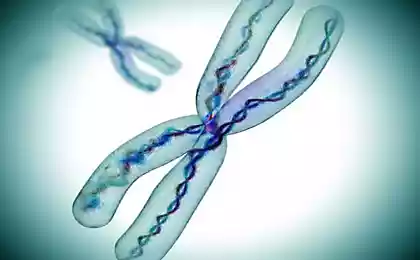540
Scientists have found a path to human immortality

Sensational news came from a group of researchers at Stanford University. Scientists have found a completely safe way of extending the end parts of chromosomes which are responsible for human aging. Potentially this discovery will enable mankind to gain eternal life.
Telomeres are the end segments of chromosomes that are characterized by lack of ability to link with other chromosomes and are protective. It is believed that there are so-called Hayflick limit, when human cells dividing in cell culture die after about 50 divisions and begin to show signs of aging when approaching this boundary. The Hayflick limit is associated with a reduction in the size of telomeres, and scientists around the world for many years looking for a way to lengthen the DNA at the ends of chromosomes.
Numerous studies have proven that maintaining a healthy lifestyle and different diet help slow down telomere shortening, but bad habits and even regular consumption of soft drinks, on the contrary, accelerates the reduction of the length of these parts of the chromosomes. Once the telomeres are approaching the Hayflick limit by natural or other external reasons, a person begins to age, and also it dramatically increases the risk of cancer.
Curious fact that the theories of scientists regarding telomeres was confirmed in nature. For example, did you know that lobsters, the large marine crustaceans, are not aging at all? It turns out that lobsters have self-repairing DNA, and can potentially live forever. The DNA repair does the enzyme telomerase that acts on telomeres, expanding and restoring their original length.
Scientists at Stanford University have developed a new technology that uses modified RNA carrying the gene telomerase reverse transcriptase (TERT). The introduction of such RNA in the culture of human cells repeatedly increases the activity of telomerase, for a period of one to two days. This period of active telomerase extends telomeres, after which programmed RNA completely falls apart. The resultant cells behave similarly to young and share many times more than cells of the control group.
"We found a way to lengthen human telomeres by more than 1,000 nucleotides, turning back the passage of time for human cells, which is equivalent to many years of human life, — told reporters Helen Blau, Professor of Microbiology and immunology at Stanford University, Is opening will also help us to increase the number of cells for numerous studies of medication and disease modeling".Very important in this discovery is its safety. After all, previous attempts to lengthen the telomeres, usually ended in uncontrollable cell division, which in the body can result in cancer. A key advantage of the new technology is its short-term effect on telomeres. Immunity does not have time to respond to injected RNA, which completely disintegrates after a certain time.
In the future we can expect use of this technology for the treatment of genetic diseases, accelerates the aging process of the human body. Of course, preparations for the prolongation of human life can also be born, but now I do pharmaceutical corporations have them public.
Source: hi-news.ru























